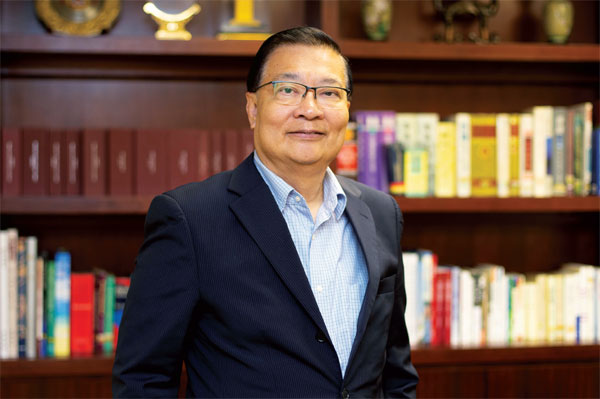Extradition bill should be passed soon: Tam
Updated: 2019-05-24 07:13
By Joseph Li in Hong Kong(HK Edition)
|
|||||||
Former DAB chairman says Hong Kong people have nothing to fear from proposed changes
Hong Kong people have nothing to fear from proposed amendments to the Fugitive Offenders Ordinance and the Mutual Legal Assistance in Criminal Matters Ordinance, former lawmaker Tam Yiu-chung told China Daily in an exclusive interview.
The former chairman of the Democratic Alliance for the Betterment and Progress of Hong Kong also said he fully supports these amendments.
They will enable the government, in the interests of justice, to surrender the Hong Kong man who admitted killing his girlfriend in Taiwan last year, he said. The revision will also allow Hong Kong to enter into agreements with other jurisdictions such as the Chinese mainland, Taiwan and Macao.
|
Veteran politician Tam Yiu-chung tells China Daily the dispute surrounding the city's extradition bill has come to a point where the central government has to break its silence, following smear campaigns attacking the central government and Hong Kong authorities, 'one country, two systems' and the mainland's judicial system. Roy Liu / China Daily |
As the amendments clearly state that the law will only target fugitive offenders of serious crimes, law-abiding Hong Kong people will have nothing to worry about. He said ordinary citizens have been telling the DAB they are unconcerned about the proposed fugitive law amendments.
Tam, who is a member of the Standing Committee of the National People's Congress, noted that Hong Kong has signed mutual legal assistance agreements with 32 jurisdictions and surrender of fugitive agreements with 20 jurisdictions. There are no such agreements between Hong Kong and the Chinese mainland but these are permitted under Article 95 of the Basic Law.
"Since Hong Kong has not entered into agreements with many other jurisdictions 22 years after its return to the country, Chief Executive Carrie Lam Cheng Yuet-ngor wants to settle two issues at once; the central government is supportive.
"If such agreements are not reached, the SAR government will then have to deal with each case every time.
"The CE believes there will be double safeguards after she triggers the mechanism and the courts will act as a gatekeeper when it comes to deciding whether or not to hand over a fugitive. Offenders will still be able to apply for habeas corpus or seek a judicial review of the extradition application.
"If only the section of the law concerning the Taiwan murder case is handled this time, the remaining sections will never be done in the future. This is because the opposition camp will obstruct laws involving the mainland," Tam explained.
"At the beginning, the central government did not say a word because the extradition bill was not tailored for the mainland.
"However, it has come to a point where the central government has to break its silence following smear campaigns attacking the central government and Hong Kong authorities, 'one country, two systems' and the mainland's judicial system," he added.
Tam strongly criticized the opposition camp for trying to obstruct the amendments. He was particularly critical of veteran opposition politicians Martin Lee Chu-ming and Anson Chan Fang On-sang for visiting the United States and Europe to seek foreign support in attacking the amendments.
"The extradition law amendments have become an episode in the China-US trade conflict, with people from the opposition camp willing to be manipulated as pawns by external forces," Tam noted.
"There are various human rights safeguards in regard to the extradition of fugitive offenders.
"However, people from the opposition camp seem to support fugitive offenders and not the SAR government, or perhaps they don't support the SAR government but support the US government," he noted.
Last week, the Liaison Office of the Central People's Government in the HKSAR and the Hong Kong and Macao Affairs Office of the State Council expressed support for the amendments. On Tuesday, Vice-Premier Han Zheng, the highest ranking government official in charge of Hong Kong and Macao affairs, extended the central government's full backing.
The next day, Wang Yang, chairman of the 13th National Committee of the Chinese People's Political Consultative Conference, told a visiting business delegation from Hong Kong he was totally behind the SAR government's efforts to revise the extradition law.
He also said people should be prepared for the fact that the Sino-US trade dispute will not end in the near future.
Tam said that now the SAR government has decided to resume a debate on the bill at the second reading stage during a full Legislative Council meeting on June 12, the bill should be passed as soon as possible.
Normally, a bill is first examined by a bills committee so government officials can answer questions from legislators. Unfortunately, since the relevant bills committee cannot function properly due to disruptive tactics by the opposition camp, there is no alternative but to go directly to a plenary meeting.
"This complies with LegCo's Rules of Procedure," he noted.
"At the Friday House Committee meeting (today), some will also propose dissolution of the bills committee as a way forward. The House Committee chairman, who has received the request from the secretary for security to bring the bill straight to the plenary meeting, may invite lawmakers to give their views.
"In the end, the chairman may rule that she will accede to the secretary's request and there is no rule that the secretary's request should be taken to a vote." "I hope the extradition law amendments will be passed before July 1, because after that there is still the National Anthem Bill to be carried before the summer recess in mid-July," Tam added.
joseph@chinadailyhk.com
(HK Edition 05/24/2019 page4)
